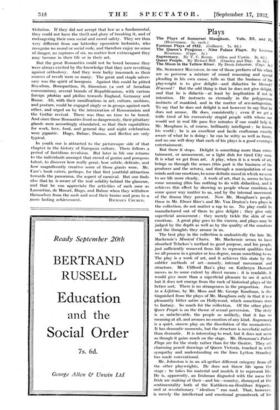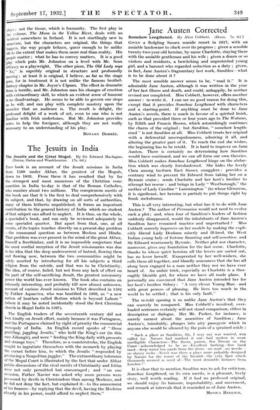Plays
The Plays of Somerset Maugham. Vols. HI. and Iv, (Heinemann. 5s. each.)
Famous Plays of 1932. (Gollancz. 7s. 6c1.) The Queen's Progress : Nine Palace Plays. By Laurence Housman. (Cape. 5s.) MR. SOMERSET MAUCHAM, in one of those prefaces of his which are so perverse a mixture of sound reasoning and special pleading in his own cause, tells us that the business of the playwright is to give delight—and didactics be blowed D'accord ! But the odd thing is that he does not give delight, and that he is didactic—at least by implication if not M intention. He instructs us eternally in the polygamous instincts of mankind, and in the matter of sex-antagonism, To say that he does not delight is not however to say that he does not amuse. He does, consistently ; even if we get a trifle tired of his excessively stupid people with whom one would not in real life pass five minutes if one could help it. Mr. Maugham is, of course, brilliantly intelligent ; he knows his world ; he is an excellent and facile craftsman exactly aware of what he is doing : he can be witty as well as funny, and no one will deny that each of his plays is a good evening's entertainment.
But there it stops. Delight is something more than enter. tainment, or amusement, or a light dish for tired City men. It is what we get from art. A play, when it is a work of art, brings us through the senses (this part is the business of the producer and the actors), and through a manipulation of our minds and our emotions, to some definite mood in which we scent to see life more clearly. A work of art, that is, seems to have some meaning (this has nothing to do with didactics), and it achieves this effect by showing us people whose emotions in some queer way matter to us, and by the internal movement of the drama they present. Now Mr. Maugham's people, those in Mr. Elmer Rice's and Mr. Van Druten's two plays in the collection, do not matter a rap to us. No play could be manufactured out of them to give delight ; they give only superficial amusement ; they merely tickle the skin of our emotions. A great play goes to the viscera, and plays may be judged by the depth as well as by the quality of the emotions and the thoughts they arouse in us.
The best play in the collection is undoubtedly the late Mr. Mackenzie's Musical Chairs. Mr. Mackenzie seems to have absorbed Tchekov's method to good purpose, and his people, just sufficiently removed from life to represent qualities that we all possess in a greater or less degree, mean something to us. The play is a work of art, and it achieves this state by the subtler methods of art—namely, internal movement and structure. Mr. Clifford Bax's play on Katheryn Howard moves us to some extent by direct means : it is readable, it would give more than a superficial pleasure to see it acted, but it does not emerge from the ruck of historical plays of the better sort. There is no strangeness in the proportion. Once in a Lifetime, by Mr. Moss and Mr. George Kaufman, is dis- tinguished from the plays of Mr. Maugham only in that it is a pleasantly bitter satire on Hollywood, which sometimes rises to fantasy. So much for the collection. Of the other plays Queer People is on the theme of sexual perversion. The story is so unbelievable, the people so unlikely, that it has no meaning at all, and arouses no emotion of any kind. Supremacy is a quiet, sincere play on the dissolution of the monasteries. It has dramatic moments, but the structure is novelistic rather than dramatic. It is interesting to read, but it does not seem as though it gains much on the stage. Mr. Housman's Palace Plays are for the study rather than for the theatre. They are charming pencil drawings of Queen Victoria, touched in with sympathy and understanding on the lines Lytton Strachey has made conventional.
Mr. Johnston is in an altagether different category from all the other playwrights. He does not throw life upon the stage : he takes his material and models it to represent life. He is, apparently, an Irishman disgusted with the mess the Irish are making of their—and his—country, dismayed at the sentimentality both of the Kathleen-na-Houlihan frippery, and at revolutionary " idealism " run mad. That, however, is merely the intellectual and emotional groundwork of his playa ; not the tissue, which is humanity. The first play in the volume, The Moon in the Yellow River, deals with an hcident somewhere in Ireland. It is not startlingly new in ;fracture, but the characters are original, the things that happen, the way people behave, queer enough to be unlike life to the extent that makes them more real than reality. His people matter ; what he has to convey matters. It is a good play which puts Mr. Johnston on a level with Mr. Sean O'Casey as a playwright. The other piece, The Old Lady says " No," is superbly original in structure and profoundly moving : at least it is original, I believe, as far as the stage goes, for in treatment it is not unlike the famous brothel- fantasy chapter in Mr. Joyce's Ulysses. The effect in dramatic form is terrific, and Mr. Johnston uses his changes of emotion with extraordinary skill, to which an evident sense of humour is no disadvantage. He seems to be able to govern our stops as he will, and can play with complete mastery upon the recorder that an audience is. The result is delight, the profound delight of a work of art, even to one who is not familiar with Irish undertones. But Mr. Johnston provides notes to help the foreigner, although they are not really necessary to an understanding of his play.
BONA M Y DOBREE.































 Previous page
Previous page